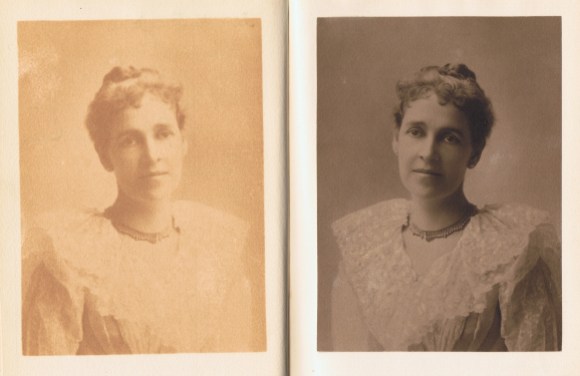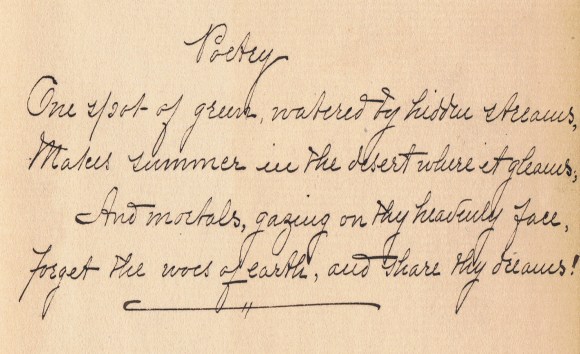
Three decades ago, in a buy-sell-trade bookshop in Plattsburgh, New York, I came across a two-volume set of collected Poems published in 1916. Unfamiliar with the poet but intrigued by a platinum print photograph of a woman pasted inside the front board of volume one (above), I purchased the set for $2.50 and went home.
For nearly two decades I wondered over the identity of the woman, and came to find—through an internet search—that it was the poet herself, Florence Earle Coates. Mystery solved. But I would not be satisfied with this knowledge alone. It was merely the beginning of a dedicated search into the life and times of a woman who had become my muse.
Scant information was initially available on the poet. It appeared that her thoughtful, finely crafted works of poetry were important in her day—in her circles—but perhaps had not survived a supposed “renascence [sic] of poetry” or test of time.
I resolved to remedy this by bringing her works back to life, but was at a loss as to how to do so until one of my children informed me that they had “edited” the Dr. Pepper article at Wikipedia. This planted a seed which would germinate a couple years later in 2009, when I created Mrs. Coates’ article at Wikipedia and author page at Wikisource—gradually adding all of her volumes of poetry over the span of about two years.
But my activity did not stop there. To quote another contributor, “the power and potential of [Wikisource] is mind-blowing”: where one work refers to another (via wikilinking), thereby contributing to the “great conversation.” One author, one book leads to another author, another book—another idea.
Seeing a work to its completion is a satisfying thing, but the process is perhaps even more rewarding. Word by word, line by line, page by page, proofreading is an active and learning process, as no two works are formatted alike.
When necessary, there is no shortage of help from other contributors. Each offers different abilities, gifts and perspectives to the site, and I find most are eager and willing to share their unique insights and skills. You get out of proofreading what you put into it. Coates writes, “Great symphonies require more than one hearing; great poems more than one reading.” It is beneficial to first proofread and then re-read, thus ensuring the accuracy of editing, if not the cultivation of the mind.
I developed anxiety following an illness a few years ago, and found proofreading to be a helpful stress reducer. One can develop a rather relaxing rhythm to editing poetry, particularly when proofreading longer works such as The Prelude by William Wordsworth:[1]
“Now here, now there, moved by the straggling wind,
Came ever and anon a breath-like sound,
Quick as the pantings of the faithful dog,
The off and on companion of my walk;
And such, at times, believing them to be,
I turned my head to look if he were there;
Then into solemn thought I passed once more…”
I use this passage to illustrate how proofreading such poetry, for me, is much like walking in step to the cadence of the panting of a faithful dog—it can be a very relaxing bit of mental exercise; but a word of warning: one must be careful to maintain focus and not become overly transfixed by the rhythmic pattern or fall into reverie too often during proofreading otherwise OCR errors and typos will be overlooked!
I owe much to the works of Mrs. Coates, for her poetry sings of hope and joy, beauty and the ideal. But I am also thankful to Wikisource and its welcoming community for providing a space to showcase her poetry—and to my family, who has tolerated this editing hobby of mine.
I received the following after posting some of Mrs. Coates’ poetry (on loss, grief and immortality) to another website: “Thanks for sharing these poems. I love her perspective on the human condition. I’d never heard of Coates before, but I’ll never forget her now.” My reply to the gentleman included a line from Coates’ “Deathless Death,” which states “no good, once given, can be lost.” I shared the same words a few years back with a woman whose son had died. She spoke of her son’s goodness, and the life-affirming words came to mind.
This in a nutshell is why I proofread poetry. It is the stuff of the soul; it speaks to the body, the mind, and the spirit alike. In the words of Mrs. Coates, “poetry in some form is necessary to all—save, perhaps, to those who are content to live upon bread alone.”
Sonja N. Bohm
English Wikisource contributor

[1] Florence Earle Coates wrote a poem about Wordsworth entitled “Breathless We Strive.”.
“Why I …” is a new ongoing series for the Wikimedia Blog. We want to hear what motivates you to contribute to Wikimedia sites: send us an email at blogteam[at]wikimedia[dot]org if you know of someone who wants to share their story about what gets them to write articles, take photographs, proofread transcriptions, and beyond.

Can you help us translate this article?
In order for this article to reach as many people as possible we would like your help. Can you translate this article to get the message out?
Start translation